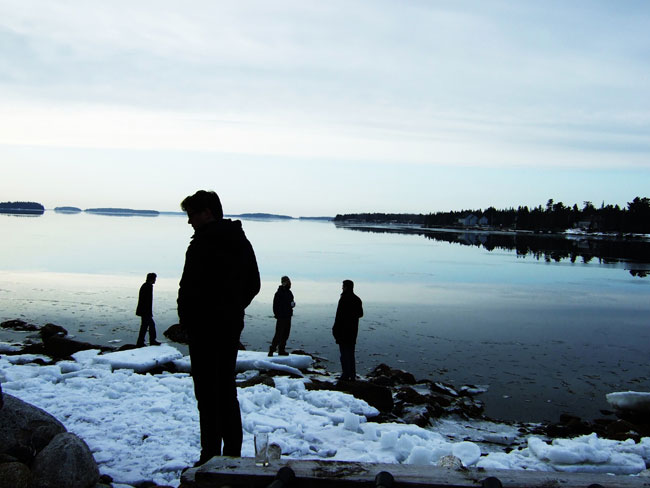Extracts of a conversation with French writer Jean Cavé
Last October I hosted an unconventional Shabbat dinner of soy and orange salmon and fennel in my Paris apartment with a friend, who had invited her French family friends. This is how I met Jean Cavé and his wife, France, who entertained us all evening with their stories. A bottle of olive oil prompted an account of their honeymoon on a small Greek isle and our communal struggles with the French language reminded them of how their daughter had taught her American husband how to speak French fluently. Jean also explained how he had met my friend’s family while staying in Flagstaff, Arizona, to do research at Lowell Observatory for his next book. Eight months later I contacted Jean for an interview and he graciously agreed to tell me about his work and current projects.
– Rachel TonThat

« De tout là-haut, le grand navire blanc se confondait avec le reflet argenté des vagues. Il avait l’air immobile dans la mer. Sa fumée s’élevait, légèrement penchée, seul témoin de sa vitesse et de sa direction. Dans le silence du ciel ne montait aucune voix. Le sillage était un trait blanc à la craie sur l’immense tableau bleu.
De plus près, un grondement profond devenait perceptible. L’acier de l’étrave découpait, brisait, faisait bouillir les molécules comme dans une marmite de tonnerre.
La mouette se rapprocha et découvrit les hommes, taches de couleur sans queue ni tête qui habitaient les ponts. C’était une île humaine qui avançait lentement vers la prochaine côte, chargée de destinées qui se croisaient dans les coursives. Un île hors du temps, un vaisseau libre, loin des embarras terrestres, un lieu de plaisir flottant où des rires se mêlaient à présent au bain d’une musique rythmée par le bruit des moteurs. Le Neptunia cinglait vers la demeure des dieux. »
– From Le Dîner du Commandant, 2006 (Plon)
I’m working on a novel that will be published next October in Paris. It is a story about astronomy, the passion of science, love, and dreams of a better world. It’s a kind of a space odyssey in the brain of an astronomer where ideas and dreams are the best rockets for travelling far away. At the same time it is a story about human mistakes. It shows how errors can be fruitful and necessary to the development of science. The story takes place mostly in the United States where I travelled for research.
It always takes a long, long time for me to write a book. For example, I found recently the first trace of the idea that led to this book written in my 1987 diary! The idea grew like a baby in the womb of my brain. When I feel the absolute necessity to give rise to it, I go and research on the topic. This time, it took me one year, reading and traveling (to New York, Arizona, Hawaii, and the Paris-Meudon observatory). Then I was prepared to write. The first draft is always huge (this time, my first version was 700 pages!). I rewrite and rewrite it until a more reasonable size, then I “kill my darlings,” as they say, and then I am ready.
My favorite time for writing is the morning; I am an early bird with a pencil or a laptop. I like those hours before sunrise when you are in front of yourself without any noise or light, just the smell of coffee and a light bulb (or a candle for romantic scenes!). My writing studio looks over my wife’s garden, but usually – when the inspiration comes – I can’t even see the garden. My only companion is the cat sitting by me like a silent guard. After one or two hours I “awake” a second time. The morning has come, people inside and outside are starting to live their life and I have to be brave and look back at what I wrote. Then begins the work, trying to make the link between the real and the fictional world.
I was recently offered an opportunity to see my work rendered in another medium. When Gétévé told me they would turn my most recent book, Accident de Parcours, into a TV movie, my first reaction was happiness. My second was confidence. It was like giving my work a second chance. I had a couple of meetings with the producer and the director. They loved the story and wanted to translate it into a script and a film. Months after, I read the screenplay and was amazed by the skill of the screenwriter. I considered it of no importance that the beginning was not the same as in the book, or that a female character had been developed. Every art has its own rules. The best recent example for me of a great film adaptation is The Hours: the link between the book, the movie, and the works of Virginia Woolf remains very strong, and every step brings new body, ideas, and richness. What is most important is the general spirit of an adaptation, not the details.

{ 1 comment… read it below or add one }
ce que je cherchais, merci
You must log in to post a comment.